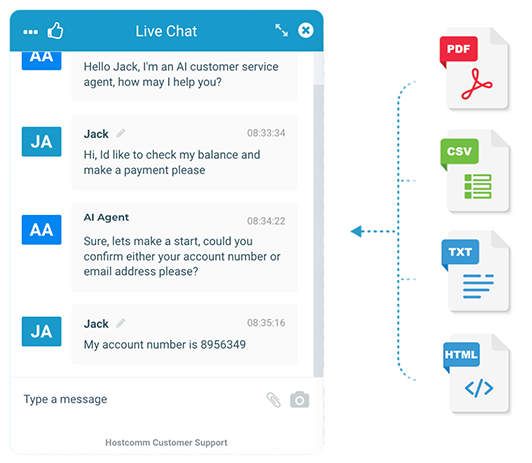In the fast-paced world of customer service, keeping up with high volumes of inquiries while maintaining quality support can be challenging. However, the emergence of AI customer service agents, particularly those powered by large language models, is transforming this landscape. This technology promises not only to reduce queued customer inquiries and bottlenecks by up to 50% but also to enhance the overall customer experience. Let's delve into how these AI agents can be a huge benefit for customer service managers.
1. Seamless Integration and Setup
One of the biggest advantages of AI customer service agents compared with classic chatbots is their ease of setup. These systems can be easily integrated with your existing customer service infrastructure using various data sources such as documents, web pages, PDFs, and customer service datasets. This flexibility ensures a smooth transition and minimal disruption to your current operations. Setting up a 'brain' for your AI customer service agent is as simple as uploading documents, manuals, product literature, terms and conditions, historical customer interactions and prescribed 'Q&A' pairs. Maintenance of the AI customer service agent's 'brain' is as easy as updating the documents and datasets on which it learns. The updates don't need to be written in a special way, just think of an FAQ section on a web site, this is the basis for 'Q&A' pairs which are readily ingested and form accurate, consistent answers.
Key Features:
- - Compatibility with various file formats and data sources.
- - Simple integration process with existing customer service systems.
- - Minimal training required to get started.

2. Stringent Personal Data Protection
In an era where data breaches are a significant concern, AI customer service agents are designed with robust mechanisms to protect Personally Identifiable Information (PII). This not only ensures compliance with data protection regulations but also builds trust with your customers. The main advantages that modern, LLM-powered AI customer service assistants have are as follows:
Advanced Natural Language Understanding: They have a much more sophisticated understanding of language, enabling them to recognise and appropriately handle sensitive information. They are more adept at identifying when a user might inadvertently share PII and can be programmed to respond in a way that discourages or prevents the sharing of such data.
Regular Updates and Learning: They are regularly updated with new data and improved algorithms, which can include enhanced features for identifying and protecting PII. This continuous learning allows them to stay ahead of emerging threats and vulnerabilities.
Customisable Data Policies: They can be configured to adhere to specific data protection policies, ensuring compliance with various regulations like GDPR, HIPAA, etc. This level of customisation is often not available with classic chatbots.
Anonymisation and Data Masking: Advanced AI models can be equipped with mechanisms to automatically redact or mask PII from conversations. This reduces the risk of accidental data exposure.
No default Long-Term Memory: They do not retain information from one interaction to the next, meaning they don't store personal data over time. This is a significant advantage over some classic chatbots that may store conversation histories, which could include PII. Storing interactions can be configured and is optional in some cases such as with ChatGPT.
Robust Security Protocols: They are often developed and maintained by organisations that implement rigorous security protocols to protect the underlying data and model. This includes measures to prevent unauthorised access and data breaches.
Ethical and Legal Compliance: AI developers are increasingly aware of the ethical implications and legal requirements of handling PII. As a result, AI models are often designed with privacy and security as a priority, adhering to high standards of data protection.
However, it's important to note that no system is entirely foolproof. The effectiveness of these AI models in securing PII also depends on how they are implemented and managed by the organisations using them. Regular audits, updates, and adherence to best practices in data security are essential to ensure the protection of personal information.
Key Features:
- - Advanced language understanding, encryption and security protocols.
- - Compliance with GDPR and other data protection laws.
- - Regular updates to stay ahead of evolving cybersecurity threats.
3. Omni-channel Support
These AI agents are not limited to a single mode of communication. Whether it's email, SMS, or social media, they can handle inquiries across various channels, providing a consistent and unified customer experience. For example, Email can be transformed into a useful, chat-like service with accurate responses being sent in a timely manner. Instead of bottlenecks causing huge delays, customers receive exactly what they are requesting in the majority of cases, within a few minutes. This level of service is easily applicable to any communications channel. AI customer service agents can also handle multiple queries simultaneously and switch between topics seamlessly, a feature typically beyond the capabilities of traditional chatbots.

Key Features:
- - Integration with multiple communication channels.
- - Uniform response quality across all platforms.
- - Ability to handle high volumes of inquiries simultaneously.
4. Continuous Learning and Improvement
The application of large language models means these AI agents are self-learning. By analysing historical responses and customer interactions, they continuously improve, leading to more effective and efficient customer service over time. This is due to the improvements in LLMs and language chains that can efficiently ingest data and quickly reconfigure when new data is added, without any coding being required. In thoughtfully executed setups, the AI customer service assistant undergoes a training phase. During this period, agents cherry-pick the most effective responses generated by the AI. This selection process feeds into the AI’s learning mechanism, thereby enhancing the precision and relevance of its future responses. In contrast, traditional chatbots lack this self-improvement feature and operate strictly within their initial programming.
Key Features:
- - Machine learning capabilities for ongoing improvement.
- - Adaptation to new queries and customer service scenarios.
- - Reduction in response times and error rates.
5. Enhanced Accuracy and Intent Matching
AI agents excel in understanding and matching customer intents, thanks to their advanced natural language processing capabilities. This leads to more accurate responses and a higher resolution rate at the first point of contact. First generation chatbots such as Google Dialogflow, Amazon Lex and IBM Watson all worked by matching an intent phrase to a pre-loaded list. The accuracy depended on the phrase matching and it was prone to error and returning a default answer such as "I'm sorry could you re-phrase your question". AI customer service agents work in an entirely different way, they are very similar to ChatGPT but can answer specific questions about your products and services.
Key Features:
- - Superior natural language understanding.
- - High accuracy in response generation.
- - Reduced miscommunication and improved resolution rates.
6. Lifelike Conversations
Gone are the days of robotic responses. These AI agents are more lifelike and better at conversations, making interactions more pleasant and human-like for customers. Most people have interacted with ChatGPT in 2023 and will confirm that one of the appealing aspects is its human-like mannerisms albeit they do tend to avoid slang, profanities, emojis etc and are more articulate generally. AI customer service agents are better at understanding the context of a conversation, allowing for more coherent and relevant responses. Traditional chatbots often struggle with context, leading to less accurate or irrelevant replies. The customer will tend to be more patient and less prone to selecting agent handoff options if the conversation is similar to a human to human one. Furthermore, many modern AI agents are designed to recognise and respond to emotional cues in text, which helps in providing more empathetic responses. Classic chatbots lack this emotional intelligence and are unable to adjust their responses based on the customer's mood.
Key Features:
- - Advanced conversational abilities.
- - Ability to understand and respond to nuances in language.
- - Creation of a more personalised customer experience.
FAQ Section
- How quickly can AI customer service agents be implemented?
- Implementation time can vary but is generally swift due to their ease of integration with existing systems.
- Are these AI agents capable of handling complex queries?
- Yes, they are designed to handle a range of queries, from simple FAQs to more complex issues.
- How does the AI ensure data privacy and security?
- AI agents are equipped with advanced security protocols and comply with international data protection regulations.
- Can the AI service handle multiple languages?
- Yes, many AI agents are equipped with multilingual capabilities.
- Is human intervention still necessary with AI agents?
- While AI greatly reduces the need for human intervention, complex issues may still require human assistance.
- How do AI agents learn and improve over time?
- They analyze past interactions and responses, constantly refining their algorithms for better performance.
- Can AI agents be customized to fit our brand's tone and style?
- Absolutely, customization options allow AI agents to align with your brand's unique voice.
- How does the AI handle multiple inquiries simultaneously?
- AI agents are designed to handle high volumes of inquiries efficiently, without compromising on quality.
- Are there any industries where AI customer service is particularly effective?
- AI customer service is versatile and can be beneficial across various industries, including retail, finance, and healthcare.
- What are the cost implications of implementing AI customer service agents?
- While initial setup costs may exist, the long-term ROI through efficiency and customer satisfaction is substantial.
In conclusion, AI customer service agents are not just a futuristic concept but a practical, efficient solution available today. By embracing this technology, customer service managers can significantly reduce queues and bottlenecks, paving the way for a more streamlined, effective, and customer-centric service approach.
For more information on on Hostcomm's customer service agent please click here >>>














